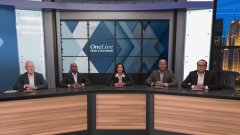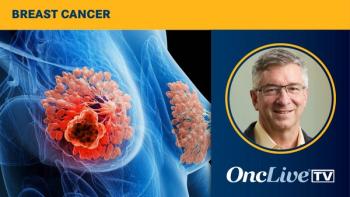
Recent Data on Neoadjuvant Therapy in HR+/HER2- Breast Cancer
The expert panel reviews data updates on neoadjuvant therapy in HR+/HR2- early breast cancer and discusses the role of CDK4/6 inhibition in this setting.
Episodes in this series

Transcript:
Komal Jhaveri, MD, FACP: Maybe we can think about what else is new and maybe it might have been covered at the [annual meeting when we think about neoadjuvant therapy. I know we utilize, for our HER2-positive patients and our triple-negative breast cancer patients, a lot more neoadjuvant therapy because we see that there is an improvement in pathologic complete response [pCR] that can translate into event-free survival. However, we don’t necessarily see that with HR [hormone receptor]-positive disease. Where do you think is an opportunity for neoadjuvant therapy, or could you just share some data that might be trying to address the unmet need in that space for [patients who are] HR positive?
Gregory Vidal, MD, PhD: It’s been represented many times that we have a sort of lower pathologic complete response rate, although those patients don’t necessarily do worse than the outcome. We have to think whether or not [pCR] is a good measure of outcome for that population. There have been some studies, I-SPY 2 recently, that was presented at ASCO [American Society of Clinical Oncology] 2023 [meeting], where they used oral paclitaxel vs IV [intravenous] paclitaxel with some of our familiar drugs, carboplatin, and then immunotherapy. And that combination showed a slightly increased [pCR] rate, which was interesting and needs further studies. But at least the I-SPY2 [trial; NCT01042379] is sort of an adaptive response trial. So further studies need to be done in that population, but overall, it appears safe and there appear to be some signals.
Komal Jhaveri, MD, FACP: That is exciting because when we think about immunotherapy, we’re not really thinking about HR-positive breast cancer, we’re thinking about triple-negative breast cancer. We have approval both in the neoadjuvant setting for triple-negative breast cancer and in the metastatic setting in the first line for checkpoint inhibition. So I think this is an important interesting initiative to try to see if there is a role, and could that be a studied need in the I-SPY adaptive design.
Gregory Vidal, MD, PhD: I will also add [that] using in the neoadjuvant space it’s not necessarily looking at [pCR], but is it going to give us a signal about how we can treat those patients in the adjuvant setting? For example, the coopERA study [NCT04436744] looked at giredestrant, which is an oral SERD vs aromatase inhibitor, and [saw] whether or not [there was] a decrease in Ki-67, for example, or cell cycle arrest, which could predict benefit [in the] long term. It appears to be that when you give giredestrant in that study, we have a decrease in Ki-67. We see an increase in cell cycle arrest at surgery. And that led to an adjuvant study using this oral SERD vs aromatase inhibitor, which is what we do standard in that population.
Komal Jhaveri, MD, FACP: Yes, the lidERA phase 3 trial [NCT04961996]. I think the upfront strategy [is] to try to evaluate whether an oral SERD would be more effective compared to our current standard, which is aromatase inhibitor or tamoxifen. So that is certainly exciting, and I think the I-SPY trial has really set a very good stage I think in that sense to be able to identify promising therapies in the neoadjuvant setting that then have a leg that could lead to an approval. I think the best example that we have is pembrolizumab and the I-SPY evaluation of the neoadjuvant pembrolizumab, and now we have KEYNOTE-522 [NCT03036488], which is a randomized phase 3 [trial] that changed our standard of care for our high-risk triple-negative breast cancer patients.
So, I think this example, like coopERA, and now we have lidERA as an adjuvant study, could serve as an example of such an approach of neoadjuvant evaluation that might lead to some success in adjuvant setting. One other question that I was curious about [was]—what do you think, Aditya?—might be the role or is there a role for considering CDK4/6 inhibition in the neoadjuvant setting? Would that approach be utilized, especially when we’re thinking about RxPONDER [NCT01272037] data? When would you think about utilizing a CDK4/6 inhibitor or just endocrine therapy in the neoadjuvant setting, especially if based on the RxPONDER data, you would say that node-positive patients, many of them postmenopausal, might not require chemotherapy? Usually, when we think about neoadjuvant, we’re thinking chemotherapy. So maybe talk us through that thought process of how you think about that?
Aditya Bardia, MD, MPH: Absolutely. I think there are 2 components to this. One is the use of chemotherapy either in the neoadjuvant or adjuvant setting, that is decreasing now with the RxPONDER and TAILORx [NCT00310180] data, if there is a patient who does need adjuvant chemotherapy. So if for some reason a patient had multiple positive lymph nodes and the physician sent [them for] Oncotype DX [testing] and it’s high, I would rather use chemotherapy in the neoadjuvant setting than in the adjuvant setting. So if known for sure, this patient is going to need adjuvant chemotherapy, I generally would use it in the neoadjuvant setting in terms of CDK4/6 inhibitor. There have been multiple trials in the neoadjuvant setting, and they’ve shown that the results are equivalent to endocrine therapy alone. Results similar to chemotherapy. The challenge there is, what’s a good biomarker to assess in ER-positive disease? Because the pCR rate is so low, you cannot look at pCR. Ki-67 with chemotherapy is not a good marker. So we don’t have a good marker to look at to judge the success of a therapy in the neoadjuvant setting, and I think that’s been the challenge. Moving forward, we’d probably see studies comparing chemotherapy to CDK4/6 inhibitors, and I think that would be a step forward. We’ve already decreased the use of chemotherapy. Can we decrease it even further with the use of CDK4/6 inhibitor? There are trials ongoing in Europe looking at this strategy of how we can further use CDK4/6 inhibitors in this setting.
Transcript edited for clarity.
Clinicians referring a patient to MSK can do so by visiting msk.org/refer, emailing referapatient@mskcc.org, or by calling 833-315-2722.





































